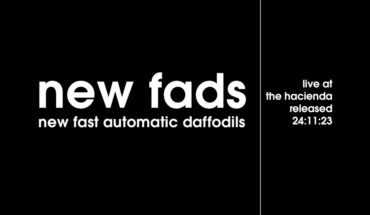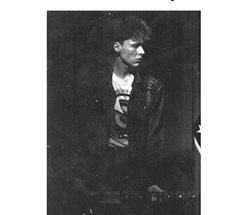Enigmatic purveyor of the songs that saved your life, avowed celibate humasexual and esteemed Penguin author, put your hands together for Steven Patrick Morrissey. In anticipation of the release of his forthcoming LP, World Peace is None of Your Business, we’re diving into the former Smiths man’s solo back catalogue to select his most essential tunes. Here’s ten from his arsenal (ahem), a Donald Rumsfeldian mix of some known unknowns and the unknown knowns.
10. ‘Dagenham Dave’
Morrissey delivers an amusing and concise observation about parochialism, insularism and limiting nature of towns and the peculiar creatures that inhabit them. Every town has one, the Man about town, Jack the Lad, lothario, local bad boy and heartbreaker. Dave struggles to keep the commotion in his loins under control, his gaze permanently fixed on the bosom of any maiden who crosses his path. Flashy Dave drives a Ford Mondeo with interchangeable female names across the windscreen. All the girls adore him, some of the lads admire him, but, you know it’s a sham. There’ a fine line between flirty and being a pest. Dave crosses that line every waking moment. John Berger’s seminal tome Ways of Seeing (1972) posited the notion of the (male) “spectator-owner … men act and women appear”. Dave’s Desert Island Disc book that. The cover had ‘cheeky chappie’, Essex wide boy and in no way shady wheeler dealer Terry ‘El Tel’ Venables.
9. ‘Everyday is like Sunday’
His second release and also featured on his debut LP, 1988’s Viva Hate. Inspired by John Betjeman’s poem Slough and Nevil Shute’s novel On the Beach the song is a lament to faded seaside towns, bereft of colour and life and “silent and grey”. The dropping of a nuclear bomb could only improve matters. It was also a time when Sundays were considered drab, no dragging of families to B&Q then but 1988 also saw a change in the Licensing Laws wherein pubs could open from 11am to 11pm. This is a great example of Morrissey finding a diamond in the coal, his lyrics celebrating the humdrum once more. The symphonic swooping strings of Stephen Street enhance the feeling of melancholia. It has been covered by The Pretenders, 10,000 Maniacs and The Decemberists’ Colin Meloy.
8. ‘Interlude’
Released as a stand-alone single in August 1994 following the release of Vauxhall and I this cover of a 1968 Timi Yuro song saw Morrissey duet with Siouxsie Sioux (of Siouxsie and the Banshees fame); one of his long time women of wonder (c.f. Sandie Shaw, Nancy Sinatra, Edith Sitwell etc). The pair fell out (rumours persist that they never actually shared the same singing space to a disagreement over the choice of cover) with Morrissey typically and cryptically proffering “On the doorstep (Siouxsie) asks me whether right or left would be the best direction to find a taxi, and although her best bet would be left, I suggest she turns right. It is churlish of me, but it is she who has set the pace.” That clears that one up then. This lovely, yearning and mourning number about being in the throes of love, the clashing feelings of excitement and terror of if it will last, the if nots and why nots reached number 25 in the UK, a travesty I’m sure you’ll agree.
7.’ Irish Blood, English Heart’
Morrissey has long been fascinated by notions of identity, especially his own previously tackling the subject through songs like ‘Bengali in Platforms’, ‘National Front Disco’ and ‘Asian Rut’ resulting in misguided accusations of racism. This continued at Finsbury Park in 1992 when, supporting Madness, he arrived on stage draped in a Union flag; clearly conclusive evidence that he was indeed a racist. He dreams of a time when he (and others) can stand by the “flag, not feeling shameful, racist or partial”. (The flag would undergo its own rehabilitation a few years later when it was used to promote New Labour’s bringing people together tosh with ‘Cool Britannia’.) This song from 2004’s You Are the Quarry (after a gap of seven years) sees him stating how he views himself, born to Irish immigrants yet resoundingly English too; a stranger in his own interior. He takes aim at his perennial targets the monarchy, the two-party electoral process that deigns to call itself democracy and the NME who since 1992 had led a witch hunt. Reparations would be made between the two only for the music paper to again accuse of him of racism for comments he made. Morrissey successfully sued the paper.
6. ‘On the Streets I Ran’
An autobiographical number from the annals of Morrissey’s backstory as he retraces his upbringing and charts his path from the ‘slums’ of Manchester (for further evidence see his autobiography where the industrial city of the North West of England is depicted as a shanty town, ever the dramatist),the highs and lows of The Smiths: “Turning sickness into (un)popular song” to his settling in Los Angeles. His new homeland is a place where “everybody’s friendly but nobody’s friends”. The finale sees him pleading to be spared (from whom we do not know), in his idiosyncratic fashion he offers up in his place the ill, the newly born and the inhabitants of Pittsburgh and Pennsylvania. A great recurring riff dominates this example of Morrissey in fine fettle from 2006’s Ringleader of the Tormenters.
5. ‘Speedway’
Closing Vauxhall and I Morrissey plays cat and mouse with his detractors. Perennially keeping people guessing he intones:
All of the rumours keeping me grounded
I never said they were completely unfounded
Which rumours is he referring to? He closes by singling out one individual who he feels needs telling that his loyalty never wavered:
Could have mentioned your name
I could have dragged you in
Guilt by implication
By association I’ve always been true to you
As always he hints and teases and steadfastly refuses to admit to his own transgressions or name the guilty. Cloak and dagger to the last.
4. ‘Suedehead’
‘Suedehead’ was The Pope of Mope’s first solo release less than six months following The Smiths’ split in September 1987. A gloriously bequiffed Morrissey undertakes a pilgrimage to James Dean’s grave. Dean also graced the cover of ‘Bigmouth Strikes Again’. The video is very un-Morrissey like, with him playing bongos and driving a tractor. The lyrics are a sardonic riposte to a former lover who just won’t let it go. After one transgression too many such as peeking into Moz’s diary, tut tut, it’s time to move on. And just who is the “good lay”? The piano-led music is a fine accompaniment for Morrissey’s aching, wailing moan.
3. ‘The Last of the Famous International Playboys’
Even though the song mentions Ronnie and Reggie Kray, Morrissey did harbour a fascination for Charlie Richardson, infamous South London ganglord (he appeared on the inner sleeve for Your Arsenal) and dabbled in gangland imagery and mythology in later years. His lines “In our lifetime those who kill, the news world hands them stardom” are more an attack on a salacious media and their elevation and enshrinement of miscreants, deviants and malcontents e.g perennial folk devils Brady and Hindley, although he categorically does not endorse slaying, throat-slitting or concrete booting. Well, maybe for a former drummer of his. The band comprised of Andy Rourke, fifth Smith Craig Gannon and Morrissey’s soon-to-be bête noire, Mike Joyce.
2. ‘The More You Ignore Me the Closer I Get’
The first single released from arguably Morrissey’s last great and complete album, Vauxhall and I in 1994. By spurning my advances you only end up increasing my desire to be near to you. It’s counterproductive. I will get you in the end, you will relent, submit and acquiesce. I will haunt you in your slumber, I am part of your being now, there’s no going back. Stalkerish and creepy yet also tender. The song also foresaw Morrissey’s later dealings in the High Court in 1996 when he was described as ‘truculent, devious and unreliable’ by the judge. As if.
1. ‘We Hate It When Our Friends Become Successful’
Morrissey takes a swipe at the bitterness, envy and resentment engendered by the success of another (especially if they’re Northern) and the feeling that “It should have been me”. Long rumoured to be about James’ Tim Booth who the previous year had struck gold with ‘Sit Down’. The song would appear on 1992’s Your Arsenal produced by ex-Spider from Mars and glam doyen, Mick Ronson. The deliciously caustic lyrics take aim at the protagonist’s clothes, his aged appearance and a desire to destroy them. Morrissey’s ‘”it’s really laughable, hahahahaha” mocks the petty minded and jealous.
Kevin Quinn











